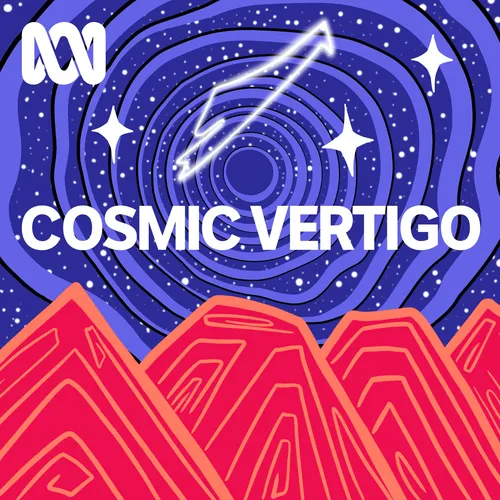
Cosmic Vertigo
Do you ever feel dizzy when you think about the incomprehensible scale of space? We call that feeling Cosmic Vertigo. Welcome to a head-spinning conversation between two friends about the sparkly -- and not so sparkly -- stuff in the sky.
- Update frequency
- every 4 days
- Average duration
- 17 minutes
- Episodes
- 60
- Years Active
- 2017 - 2021

Cosmic Query | Robots on the moon?
In Season one, Amanda and Alan took an inventory of what we've left on the Moon: golf balls, a couple of flags, 96 bags of human waste ... But Ashton, a listener, wonders whether any robots (or human…
00:05:53 |
Wed 23 May 2018

012 | Smaller than small
Zooming right in from the decommissioned dwarf planet Pluto to the humble yet powerful atom helium, Amanda and Alan measure up the smallest things in the Universe — with the aid of a strand of your h…
00:26:49 |
Tue 15 May 2018

011 | Bigger than big
The biggest things in the Universe don't necessarily last the longest.
Massive swollen stars, hundreds of times bigger than our own sun, burn through their fuel and either explode into a supernova o…
00:29:03 |
Tue 15 May 2018

Cosmic Query | Red planet... Wet planet?
Cosmic Vertigo is back — and when they're not discussing the extremes of the Universe, Alan and Amanda are answering the big questions.
Your questions.
This week, it's the little issue of water on M…
00:05:58 |
Thu 10 May 2018

GUESS WHO'S BACK?!
Cosmic Vertigo season 2 is COMING SOON! And we need your help. Want to share your own personal experience of Cosmic Vertigo? Or do you have a spacey question you're burning to ask Alan and Amanda? Gr…
00:01:52 |
Wed 07 Feb 2018

Cosmic Vertigo presents.. Sum of All Parts
Cosmic Vertigo producer Joel Werner has a new podcast!
Sum of All Parts tells extraordinary stories from the world of numbers.
The episode featured here is..
'Phoenix + Electron'..
Melbourne, 1…
00:32:17 |
Thu 12 Oct 2017
![Total Solar Eclipse [BONUS SHORT]](https://b2.eachpod.com/podcast-imgs/d902942a1834fab61dd8edd68601e1e1.webp)
Total Solar Eclipse [BONUS SHORT]
Amanda and Alan are back (for a hot minute) to celebrate the total solar eclipse of August 21, 2017!
00:02:31 |
Fri 18 Aug 2017

Cosmic Vertigo presents.. Off Track
Missing Cosmic Vertigo? Well, check out this story about a telescope so powerful it listens to time..
00:29:21 |
Wed 24 May 2017
![Outer Space Takes [BONUS EPISODE]](https://b2.eachpod.com/podcast-imgs/d902942a1834fab61dd8edd68601e1e1.webp)
Outer Space Takes [BONUS EPISODE]
Surprise! Bonus episode! Take a trip behind the scenes in the making of Cosmic Vertigo - LIVE! from the 2017 World Science Festival in Brisbane, Australia.
00:45:00 |
Thu 18 May 2017

010 | Baby pictures and bird poo
It’s amazing what you find when you try to see the dawn of time. This season of Cosmic Vertigo ends at the very beginning: the Big Bang.
00:20:51 |
Thu 04 May 2017

009 | Emptier than empty and getting even emptier
In the unimaginably vast gaps between galaxies, something is accelerating the universe towards a lonely future. Alan and Amanda shake their heads at Dark Energy.
00:26:05 |
Thu 27 Apr 2017

008 | The invisible wind
Dark Matter flies through solid walls like a ghost. Humans have buried super-sensitive crystals to try and detect it - and our Universe doesn’t make any sense without it.
00:27:09 |
Thu 20 Apr 2017

007 | Black holes don't suck
Science fiction movies make it pretty clear that black holes are terrifying, all-consuming monsters. For astronomers there’s no cooler place to try and see.
00:30:31 |
Thu 13 Apr 2017

006 | A pretty exciting place
It's a patchy, pale river in the sky - and a twirling spiral of 400 billion stars. It’s also headed for a dazzling intergalactic train wreck. Welcome to our Milky Way.
00:18:00 |
Thu 06 Apr 2017

005 | Where are all the aliens?
Alan and Amanda debate the number of civilisations that might be out there, get the maths wrong, and argue about whether our biggest barriers to coexistence would be linguistic or… dietary.
00:37:19 |
Tue 04 Apr 2017

004 | Wobble and wink
The science of exoplanets is stupendously fast-moving. The more we look for alien worlds, the more of them we find. Thousands and thousands of them, all with terrible names.
00:22:04 |
Thu 30 Mar 2017

003 | The bigger they are, the faster they burn
What makes a star a star? When will Betelgeuse explode? Amanda explores what "any day now" means in astronomy and Alan starts measuring mass in millions of marsupials.
00:27:28 |
Thu 23 Mar 2017

002 | Measly little specks of dust
Our Solar System started out as a chaotic Primordial Pancake. Now it hosts the eight planets we know and love, plus poor old Pluto, plus some other stuff. Like asteroids with their own moons.
00:29:13 |
Thu 16 Mar 2017

001 | A giant lump of rock and iron
It’s drifting away from Earth at the same rate that your fingernails grow, but the Moon is still our closest neighbour - so close, that we’ve left quite a lot of litter on its surface…
00:22:59 |
Wed 15 Mar 2017

000 | Welcome to the party! (That's us)
Meet your hosts, astronomers Dr Amanda Bauer and Dr Alan Duffy.
00:02:52 |
Tue 07 Mar 2017
Disclaimer: The podcast and artwork embedded on this page are the property of ABC listen. This content is not affiliated with or endorsed by eachpod.com.